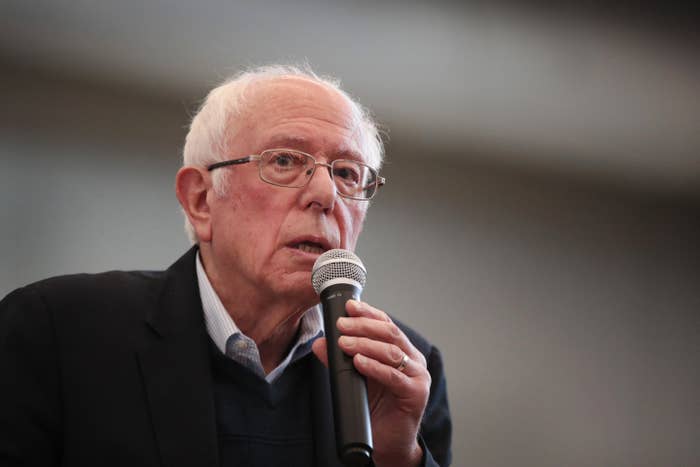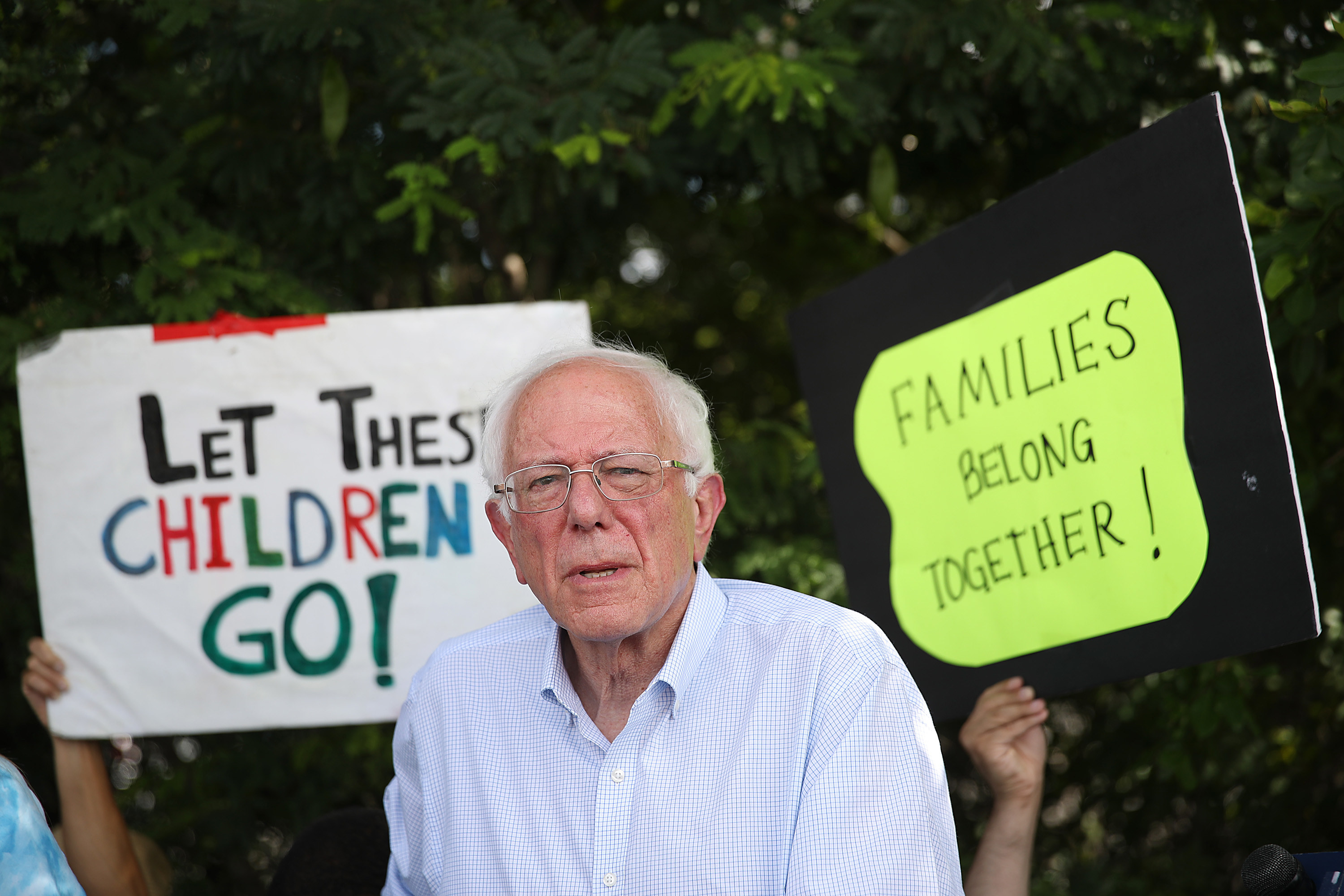
When Bernie Sanders joined the Senate, he and his allies in the labor movement took on a big target: a new comprehensive immigration reform bill.
"I believe we have very serious immigration problems in this country," Sanders said during a 2007 press event, with AFL-CIO President Richard Trumka behind him. "I think as you've heard today, sanctions against employers who employ illegal immigrants is virtually nonexistent. Our border is very porous."
“And I think at a time when the middle class is shrinking, the last thing we need is to bring over in a period of years, millions of people into this country who are prepared to lower wages for American workers,” he later added. Sanders voted against the 2007 bill, but went on to vote in favor of a similar 2013 bill while making plain his fears that it could exacerbate the issue of immigrant workers “making it harder for US citizens to find jobs.”
That rhetoric stands in stark contrast to how Bernie Sanders sounds today. Just four years after a contentious presidential primary where his immigration record was a consistent point of attack, Sanders has changed, people who have worked with him closely on immigration issues told BuzzFeed News. Sanders, they said, has spent time closely listening and working with immigrant rights activists, forming new policy and finding new ways to talk about the issue, in line with the more progressive conversations in this primary. And he is now running for president with the support of grassroots Latino activists and major immigrant rights groups.
“He has made wild shifts,” said Jess Morales Rocketto, a former Hillary Clinton campaign adviser and now the political director for the National Domestic Workers Alliance and chair of Families Belong Together. “And you know what, it’s incredible. Where he is now is absolutely outstanding. I am impressed. It’s hard to impress me when it comes to him, but he has made a shift that is quite significant.”
Sanders’ old approach to immigration — which included a focus on the potential harm new skilled and unskilled workers entering the US under guest worker programs would inflict on unemployed American citizens — stood out against his otherwise consistently progressive record. The stances were reflective of elements of the labor movement that saw immigrant workers as a threat, both in terms of lowering wages and reducing job prospects for union workers. Sanders has also pointed to one major Latino advocacy group, the League of United Latin American Citizens, which initially opposed the 2007 bill because of its potential for immigrant workers to be exploited.
"The bills that were put forth were not good bills and Bernie knew that. He knew that work visas were going to be used to severely exploit workers,” said Belén Sisa, the Sanders campaign’s Latino press secretary. “Those bills in 2007 included a lot of provisions in which workers would be put in a position where their boss would have the power to basically do whatever they wanted to them … I think that’s the perspective that no one’s really looked at.”
Sanders was concerned about a lack of protections for immigrants brought in for low-wage jobs. But he also repeatedly leaned on the idea that immigrant workers were taking American jobs, and played into a narrative — disputed by immigrant rights groups and most economists — that immigrant workers reduce wages for everyone across the board. That’s also an argument that Trump adviser Stephen Miller, known for his anti-immigrant, white nationalist rhetoric, has made more recently.
Sanders in those years still was in favor of a pathway to citizenship for undocumented people in the US, and he was a critic of the Obama administration's deportation policies. He impressed immigration activists when he pushed Barack Obama in 2014 to stop delaying DACA, a program that protects some people brought to the US illegally as children from deportation. His 2016 campaign focused on DACA and addressing the mass deportations under Obama, which Sanders said he would drastically reduce.
Hillary Clinton’s 2016 campaign still saw immigration as a vulnerability for Sanders, and her allies consistently raised his record to attack his position as the primary’s progressive champion. Clinton castigated Sanders over his vote against the 2007 immigration bill in a debate just ahead of that year’s Nevada caucus, which she went on to win.

Sanders’ immigration plan has expanded from what he was proposing in 2016, and he has so far almost entirely avoided any attacks from other candidates on his old votes.
While DACA is still a core part of Sanders’ platform and how he talks about immigration, it’s significant, activists said, that he’s now talking about using executive action for a broader moratorium on deportations that would protect many more people, while working on immigration reform that would need to happen through Congress.
Sanders’ plan also calls for the decriminalization of border crossings — which would make crossing the border without documents a civil rather than criminal offense. That’s particularly relevant for two reasons: The Republican Party has framed that position as being equivalent to wanting “open borders,” which Sanders has vehemently said he opposes in the past, and decriminalizing border crossings gets to the heart of Trump’s family separations policy, which is based on parents being criminally prosecuted for crossing the border and therefore held in criminal custody, where their children cannot be held with them.
What’s more explicit this time around, too, is Sanders’ call to break up ICE and CBP — a move that’s more progressive than any other plan left in the Democratic field — which would mean redistributing their responsibilities to existing agencies like the State Department and the Treasury.
This week, one of the largest national immigrant rights groups, Make the Road Action, endorsed Sanders for president and specifically pointed to his labor-related policies as being inclusive of immigrants, in addition to other parts of his policy platform.
Members of the group “were really excited and engaged by him and especially standing up for workers' rights, standing up against big corporations like Amazon,” said Barbara Lopez, Make the Road Action’s Connecticut director. “Making sure our undocumented folks are protected, regardless of their status, regardless of where they work, is really important.”
The group, which has members in several states and a particularly strong presence in crucial early voting state Nevada, is affiliated with the Working Families Party, which endorsed Sen. Elizabeth Warren over Sanders last September.
“He’s just really demonstrated this time around eagerness to learn and really engage with directly affected people,” she said. “What really moved our members was around the moratorium on deportations, breaking up ICE and CBP. The deep conversation we had around that this time around, we wouldn't have had a deep conversation about those things a few years back. So I think for us, there’s been a shift, and that's why we’re excited to endorse him.”
She added that she sees Sanders’ plan as “a really strong, humane immigration platform,” in addition to immigrant-friendly policies in other areas — just cause eviction requirements and national rent control in Sanders’ housing plan, universal health care, and a plan to end the school-to-prison pipeline.
In the lead-up to this year's election, and in a climate where Trump is likely to keep returning to immigration as a central campaign issue, several immigrant advocates said Sanders is more convincingly making the case that he sees progressive immigration policy as a key part of his broader plan for a more equitable system.
“I think that it’s very, very encouraging to see that Senator echoing the demands that for so many years so many immigrant activists have been calling for,” said Adrian Reyna, director of strategy for immigrant rights group United We Dream Action. “The truth of it all is that one of the biggest things that a new president has to do in regards to immigration is to move us away from this lie that in order to protect people it has to come at the expense of other people.”
Morales Rocketto, the former Clinton adviser, argued that Sanders was still not comfortable talking about immigration even earlier on in this campaign cycle. She pointed to a press conference last April in which an audience member asked Sanders why he supports “open borders.”
"I'm afraid you may be getting your information wrong," Sanders responded. “What we need is comprehensive immigration reform. If you open the borders, my God, there's a lot of poverty in this world, and you're going to have people from all over the world. And I don't think that's something that we can do at this point. Can't do it. So that is not my position.”
Morales Rocketto said she saw that as a sign that “despite the fact that he was willing to go as left as basically the field was willing to go, he still wasn’t on immigration.”
But when his policy came out a few months later, Morales Rocketto said she saw a marked change and a move towards a progressive stance on immigration more in line with his approach to other issues. She said she’s seen a change in the way he’s been talking about the issue on the campaign trail, as well.

Activists and insiders told BuzzFeed News those changes came about because Sanders has taken advice from grassroots activists and his own advisers with direct experience of the complexities of the immigration system.
“We literally took what they told us and put it into a policy, so we invited them into the process and looked at the things that they were proposing,” said Sisa, a DACA recipient herself who also worked on Sanders’ 2016 campaign. “We also took in their thoughts and what they had been seeing on the ground for years now.”
“I think that represents either considerable work on his part or a shitload of staff lobbying that really, really worked,” Morales Rocketto said. “He has Faiz [Shakir] as his campaign manager. He is a major immigration expert. So if anything, it suggests that around that issue in particular he’s trying to make changes.”
Morales Rocketto added that in a general election, being able to articulate progressive immigration policies and engage comfortably on the issue is crucial, because the Democratic candidate will be up against Trump and the GOP constantly focusing on anti-immigrant rhetoric.
It’s a sign of evolution for both Sanders’ campaign and the national conversation around immigration, according to one of the advisers who helped Sanders formulate his immigration plan in 2016, Erika Andiola, who’s now an immigration activist with the Refugee and Immigrant Center for Education and Legal Services (RAICES).
“Bernie hasn’t necessarily been an anti-immigrant politician, he does have a very close connection to the issue. I think he has really taken a lot of education from activists. He is a grassroots person,” said Andiola.
Democrats, she said, have had an “entire narrative that is like, ‘Yes, we like immigrants, but at the same time we understand that immigrants also can be detrimental to the country.’ I mean, they don’t say it that way, but that’s how it sounds. I think Bernie has really, in the way that he talks about the issues, he doesn’t really sound like that to me anymore.”
“I definitely don’t know what’s in his head,” she added. “I do know that one of the things that I did admire about Bernie is that he was really willing to change his positions when he saw that there were people he trusted” advising him to reconsider, she said.
Some activists said the shift in the conversation — partly because the Trump administration has shown the damage immigration enforcement agencies can cause to communities — has forced progressive Democrats to engage on the issue in a substantive way beyond DREAMERs and comprehensive immigration reform bills that don't get passed.
“I think it’s often an issue that the Republican Party tries to kind of create a dilemma or a political pickle for Democrats, and many Democrats kind of fall for it,” said Marisa Franco, cofounder of immigrant rights group Mijente. “The activism of folks has really created a mandate and an expectation, and peoples’ willingness to then hold Democrats accountable.”
Franco said she sees Sanders’ shift on immigration as more “an expansion and less of a departure” from the past. “I think both his talking points and the push inside the campaign for immigration was not as strong. I think this is a testament to the team and the staff inside the campaign,” she said.
That means his take on immigration is more in line with the rest of his platform, she said: “It's not like he’s saying wealth tax, eliminating student debt, but let me go a little vanilla on immigration.”
Sisa said the shift has been driven by a combination of that changing national conversation on immigration and the personal experiences of people on the campaign.
“We actually organically came together as immigrants, as the children of immigrants, from very different walks of life, and we built upon what the 2016 plan had because we knew from our own experiences that we were not in the same political climate that we were in in 2016,” she said. “So that meant that our policy needed to be more progressive.”
